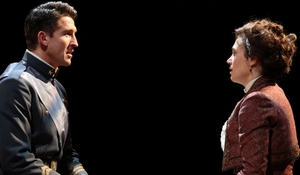SITE GUIDE
SEARCH
REVIEWS
REVIEW ARCHIVES
ADVERTISING AT CURTAINUP
FEATURES
NEWS
Etcetera and
Short Term Listings
LISTINGS
Broadway
Off-Broadway
NYC Restaurants
BOOKS and CDs
OTHER PLACES
Berkshires
London
California
New Jersey
DC
Philadelphia
Elsewhere
QUOTES
TKTS
PLAYWRIGHTS' ALBUMS
LETTERS TO EDITOR
FILM
LINKS
MISCELLANEOUS
Free Updates
Masthead
A CurtainUp Review
Much Ado About Nothing
|
Are you good men and true?— Dogberry
|

Jonathan Cake and Maggie Siff
(Photo credit: Gerry Goodstein) |
With all the Much Ados of recent years, you might think that the comedy has been drained dry. Not so. Arbus makes it more serious, more soul-searching, and more high stakes. She sets the action against the backdrop of pre-World War I in Italy, that time when the nation realized that war was at its door and needed to be confronted head on. She retains the romantic atmosphere without going theatrically over-the-top with gooey sentimentality. Instead she balances the exuberance of the young lovers with their angst, their earnest faith with their fear of betrayal. The production is also colored by the cultural mores of the time — its patriarchal society and the strong influence of the Roman Catholic Church in Italy
The able creative team emphasizes the subtle nuances of this complex play. Riccardo Hernandez's elegant set has wooden parquet floors, a narrow balcony level, a large leafy tree in the courtyard. There are just enough props to suggest the aristocratic status of Leonardo, the Governor of Messina, who presides over the goings on in this Italian village.
If Hernandez serves up elegance, Constance Hoffman settles for practicality in her costumes. The men's military outfits have clean precision, and the women's long dresses are attractive without being too ornate or fussy.
Donald Holder's handsome lighting is at its best when it's at half-tones. For example, he rightly puts the "unfaithful Hero" in silhouette (it is actually Hero's servant Margaret who is part of Don John's plot to destroy Claudio's wedding) to obscure her identity. Because things often are not what they seem in Messina, the muted lighting is perfect and teaches one of the central lessons of the play: You can't always trust your eyes (or a man's report) to reveal the truth!
When it comes to Shakespearean chops, Cake has the star turn here. Little wonder that he's performed with the Royal Shakespeare Company and taken on such plum roles as Coriolanus. It's not just that he can wrap his mouth around the iambic pentameters, difficult as that is, but that his facial expressiveness ranges from the sheepish to the arrogant. He's a real stage-taker, perhaps not by conscious design but by his sheer excellence.
Siff verbally spars well with Cake but doesn't have the same ease with Shakespeare's language. She can tug laughs from the audience all the same, however. Her Beatrice surely qualifies as a woman's libber even though she pre-dates Gloria Steinem and the Women's Liberation Movement of the 70s.
The rest of the cast makes a good showing. John Christopher Jones's Dogberry getting top honors as the buffoonish constable who uncovers Don John's treachery. One critic summed up this character as a person who has an "unrequited love affair with the English language." Indeed his malapropisms are hilarious, and legion in this play.
If you are weary of Shakespeare productions that tend to be too far-fetched in their interpretations, then this Much Ado will be a good antidote. Arbus isn't trying to hit you over the head with any grand concept here, but she surely lets Shakespeare's classic comedy come alive with all its charm.
|
Much Ado About Nothing by William Shakespeare Directed by Arin Arbus Cast: Maggie Siff (Beatrice), Jonathan Cake (Benedict), Matthew Amendt (Claudio), Michelle Beck (Hero), Denis Butkus (Conrade), Liam Forde (Balthasar/The Watch), John Christopher Jones (Dogberry), John Keating (Verges/Father Francis), Robert Langdon Lloyd (Leonato/The Watch), Kate MacCluggage (Margaret), Peter Maloney (Antonio/Sexton/The Watch), Paul Niebanck (Borachio), Saxon Palmer (Don John), Elizabeth Meadows Rouse (Ursula), Spiff Wiegand (Musician/The Watch), Graham Winton (Don Pedro). Set: Riccardo Hernandez Costumes: Constance Hoffman Lighting: Donald Holder Original Music: Michael Friedman Voice Director: Andrew Wade Fight Director: J. Allen Suddeth Choreography: Austin McCormick Props Master: Starlet Jacobs Production Stage Manager: Renee Lutz The Duke on 42nd Street, located at. 229 W. 42nd Street. Tickets: $75 and may be purchased via phone at 646-223-3010 or via the web at www.Dukeon42.org From 2/2/13; opening 2/17/13; closing 4/13//13. Tuesdays through Saturdays @ 8pm; Saturday matinees @ 2pm; Sunday matinees @ 3pm. On Sunday, February 24th, there is a matinee @ 3pm and a 7pm show. Running time: 2 hours; 30 minutes including intermission. Reviewed by Deirdre Donovan based on press performance of 2/15/13 |
|
REVIEW FEEDBACK Highlight one of the responses below and click "copy" or"CTRL+C"
Paste the highlighted text into the subject line (CTRL+ V): Feel free to add detailed comments in the body of the email. . .also the names and emails of any friends to whom you'd like us to forward a copy of this review. Visit Curtainup's Blog Annex For a feed to reviews and features as they are posted add http://curtainupnewlinks.blogspot.com to your reader Curtainup at Facebook . . . Curtainup at Twitter Subscribe to our FREE email updates: E-mail: esommer@curtainup.comesommer@curtainup.com put SUBSCRIBE CURTAINUP EMAIL UPDATE in the subject line and your full name and email address in the body of the message. If you can spare a minute, tell us how you came to CurtainUp and from what part of the country. |

Slings & Arrows- view 1st episode free
 Anything Goes Cast Recording
Anything Goes Cast RecordingOur review of the show
 Book of Mormon -CD
Book of Mormon -CDOur review of the show

